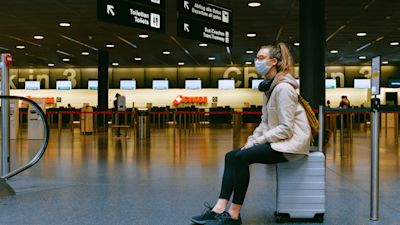Explainer
How the rules on Covid testing have changed for travel abroad

By ITV News Content Producer Jocelyn Evans
Fully vaccinated travellers returning to the UK no longer need to book Covid tests, as rules on heading overseas are eased.
Initially only announced for England - the devolved governments in Wales, Scotland and Northern Ireland have followed suit.
It means fully jabbed passengers now no longer need to take a Covid test on their second day back in the country.
How have the rules changed?
From 4 am on February 11, fully vaccinated passengers no longer need to take a Covid test before travelling to the UK - or after arriving.
You don't need to quarantine at all - but you still need to fill in that passenger locator form.
For the unvaccinated, you must have proof of a negative Covid test taken in the two days before travelling to the UK.
Once in the country, you need to book and pay privately for a PCR test to be taken after you arrive (this needs to be booked before you travel).
You still have to fill in the passenger locator form but won't need to isolate, as long as your Covid test is negative.
What were the previous rules around testing and travel?
Fully vaccinated travellers arriving into the UK were required to book and pay for a private Covid test (lateral flow or PCR) to be taken before the end of their second day back in the country.
You didn't need to isolate while awaiting the result and if it's negative you didn't need to take any further action.
If that day two test comes back positive, you were required to self-isolate in line with Covid rules.
Those who are not fully vaccinated were required to take a Covid test in the two days before heading to the UK - they had to take two more once in the country (on days two and eight - paid for privately). Regardless of the results, unjabbed passengers had to isolate for a full 10 days.
Both jabbed and unjabbed travellers needed to also compete a passenger locator form.
Coronavirus: What you need to know
Why are the rules changing?
Commenting on the changes on January 24, the prime minister said: "We have, thanks to the tough decisions, the big calls that we made… the most open economy and society in Europe.
"And although we have to be cautious, we are now moving through the Omicron wave, and you can see the figures are starting to get better.
"So what we’re doing on travel, to show that this country is open for business, open for travellers, you will see changes so that people arriving no longer have to take tests if they have been vaccinated, if they have been double vaccinated."
Do the changes go far enough to protect a struggling industry?
EasyJet boss Johan Lundgren welcomed the news, saying he believes "testing for travel should now firmly become a thing of the past".
He said “millions of our customers” will be “delighted to see the return of restriction-free travel in the UK”.
He added: “It is clear travel restrictions did not materially slow the spread of Omicron in the UK and so it is important that there are no more knee jerk reactions to future variants.”
He said the EasyJet intends to return to “near-2019 levels of flying this summer”.
Abby Penlington, director at ferry trade association Discover Ferries, said the travel industry now expects to see an increase in bookings as the relaxing of the rules will make travelling “easier, cheaper and will be a further boost to consumer confidence”.
The easing of travel rules come after the bosses of major airlines wrote to the government demanding that restriction-free travel was restored “at the very least” for fully vaccinated travellers.
The letter was signed by the heads of Ryanair, easyJet, Loganair, British Airways, Virgin Atlantic and Jet2, as well as the chief executives of holiday travel group Tui and trade body Airlines UK.